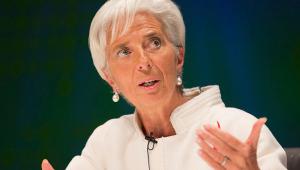Speaking at the launch of the Washington-based lender’s most recent review of the UK economy, Lagarde gave a bleak warning about the “negative and substantial” effects of a vote to leave.
She said she “had not seen anything positive” in terms the economic impact of leaving the European Union, and cautioned it could lead to a “technical recession”.
In its outlook, the fund said the 23 June vote appears to already be having an impact on investment and hiring decisions, pointing to a 40% decline in the number of commercial real estate transactions in the first three months of this year.
The IMF’s warning follows similar messages from the OECD, the Bank of England and the Treasury – which Lagarde said had no input on the IMF’s analysis.
Its report said that a vote to leave the EU would trigger a protracted period of high uncertainty, leading to financial market volatility and lower output.
Attempts to negotiate new trade agreements would be subject to significant political risks and arrangements would remain unresolved for years, the IMF said, weighing heavily on investment.
“The long-run effects on UK output and incomes would also be negative and substantial,” it continued.
Most assessments point to sizable losses in income as increased trade barriers would hamper trade, investment and productivity.
Losses would range from 1.5% to as much as 9.5% of gross domestic product depending on what the future outside of the EU looked like, it said.
Declines in excess of 1% of output would result in fiscal losses for the government, with reduced revenue offsetting any gains from eliminating contributions to the EU budget.
The fund also warned that London’s status as a global financial centre could be eroded as UK-based firms lose easy access to the rest of the EU and EU-focused businesses leave for the continent, with a potentially severe negative market reaction impacts the property market and raising borrowing costs.
The risks of Brexit are exacerbated by the UK’s record-high current account deficit, it added.
In response, chancellor George Osborne said: “The IMF are clear that even the prospect of a leave vote is already having an impact ... but the fund are also clear that this could be a mere taste of things to come.
“These are the facts British people need to hear. If we vote to leave, British families will be poorer and Britain will be poorer. Incomes would be hit, businesses would suffer, and we’d have less money to spend.”
Osborne accepted the IMF’s conclusions that Britain faces a number of challenges whatever the referendum result, but vowed he could continue to make improvements if Britain votes to remain.
While the IMF’s described its general outlook as “broadly positive”, it noted some key risks remain including a still-high deficit despite harsh austerity, sluggish productivity growth and the highest ever current account deficit. The latter two have deteriorated since the IMF’s last consultation with the UK.
It said growth is expected to fall below 2% for 2016 as a result of uncertainty around the EU referendum, before rebounding to an average of around 2.25% in the medium term.
However, this is based on a vote to remain. The IMF will release a report specifically into the consequences of Brexit in the week before the referendum.



















